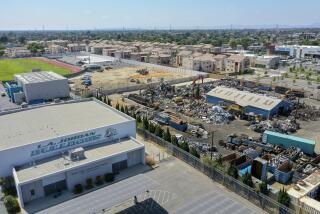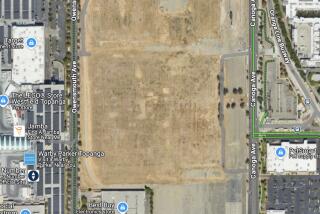South Charleston Site’s Safety Practices Called Below Par : Carbide Plant Had 16 Toxic Spills in Year
- Share via
WASHINGTON — Union Carbide Corp.’s South Charleston, W. Va., chemical factory, where a hydrochloric acid leak Monday night set off alarm sirens but injured no one, suffered at least 16 accidental releases of toxic gases in the preceding year, according to hazardous spill reports filed by the plant with the federal government.
Although most of the releases were not large, their frequency is well above the six toxic leaks reported in the same period by Union Carbide’s nearby Institute, W. Va., factory, where an Aug. 11 gas release injured 135 persons.
Leak Sickened Eight
The South Charleston record includes a March leak of mesityl oxide that sickened eight persons and an October, 1984, release of a reported 3,000 pounds of methyl chloride, a nervous system toxin and potent irritant.
Viewed alone, the leak reports suggest that the South Charleston plant has been dogged by generally minor mechanical and worker mishaps. But, in comparison to similar plants such as the one in Institute, the record indicates that equipment or safety procedures are below par, said one leading industry consultant, Dick Boggs, vice president of Organization Resources Counselor.
Equally important, recent inspections in South Charleston by the Occupational Safety and Health Administration, the federal job safety watchdog, failed to detect the sorts of persistent mechanical and human failures that have led to the leaks. OSHA cited the plant this year only for failing to erect a guard rail on a walkway and to install an eye bath in a toxic chemical handling area.
The toxic-accident reports, filed at the Coast Guard’s National Response Center in Washington, generally are required by federal law whenever a chemical release involves more than one pound of a substance deemed hazardous under the Environmental Protection Agency’s major toxic waste laws.
The reports indicate that at least three-fourths of the South Charleston accidents were the result of mechanical failures, with the remainder blamed on possible human errors such as the premature start-up of a chemical process. Methyl chloride accounted for 12 of the 16 spills, and about half of the accidents resulted in the release of more than 100 pounds of chemicals.
A Union Carbide executive in South Charleston said Tuesday that the factory’s accidents--blamed largely on stuck valves, corroded pipes, overpressurized tanks and leaky gaskets--are typical of chemical plant operations and do not pose major hazards.
Plant 55 Years Old
The South Charleston plant, which is more than 55 years old and employs 1,200 workers, has updated most of its machinery in recent years. Although some equipment dates to the 1950s, most is newer and some was replaced as recently as 1983.
“Compared to any other plant, we don’t have an extraordinary number of spills,” plant manager Robert Link said. “We might have an operator’s mistake or we might have a piece of equipment fail,” but occasional accidents are unavoidable, he said.
Union Carbide has undertaken efforts to reduce the number of accidents at its plants in response to the publicity and fear sparked by recent spills, Link said. He defended Union Carbide’s performance in Monday night’s accident, saying that local emergency agencies were notified within five minutes of the release of hydrochloric acid and that gas fumes never left the plant grounds.
Charleston officials generally agreed with the company’s assessment Tuesday.
The Monday leak was caused by a faulty gasket, a common and usually minor factor in gas releases at South Charleston and elsewhere, federal records indicate.
Sign of Safety Problems
But a plant history of such small but persistent toxic-gas accidents is an indicator of potential mechanical or worker safety problems that should not be ignored, Boggs of Organization Resources Counselor, a Washington safety adviser to dozens of the nation’s largest companies, said.
Frequent leaks from cracked flanges, rusted pipes and other small problems “seem little, but they aren’t,” Boggs said. “Clearly, what it means is the management of these locations have not taken precautions to prevent those actions from occurring. They’re not going to stop happening, but they should be significantly reduced.”
Boggs, whose group’s clients include Union Carbide and a dozen other major chemical producers, said he believes Union Carbide “has to do some very careful rethinking of their entire operation” in the wake of toxic gas incidents during the last year. He added that he must “seriously question” whether the firm’s Charleston plants should be allowed to operate normally in the wake of this month’s leaks.
More to Read
Sign up for Essential California
The most important California stories and recommendations in your inbox every morning.
You may occasionally receive promotional content from the Los Angeles Times.












